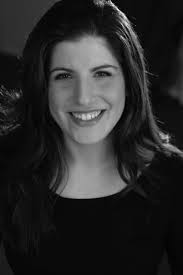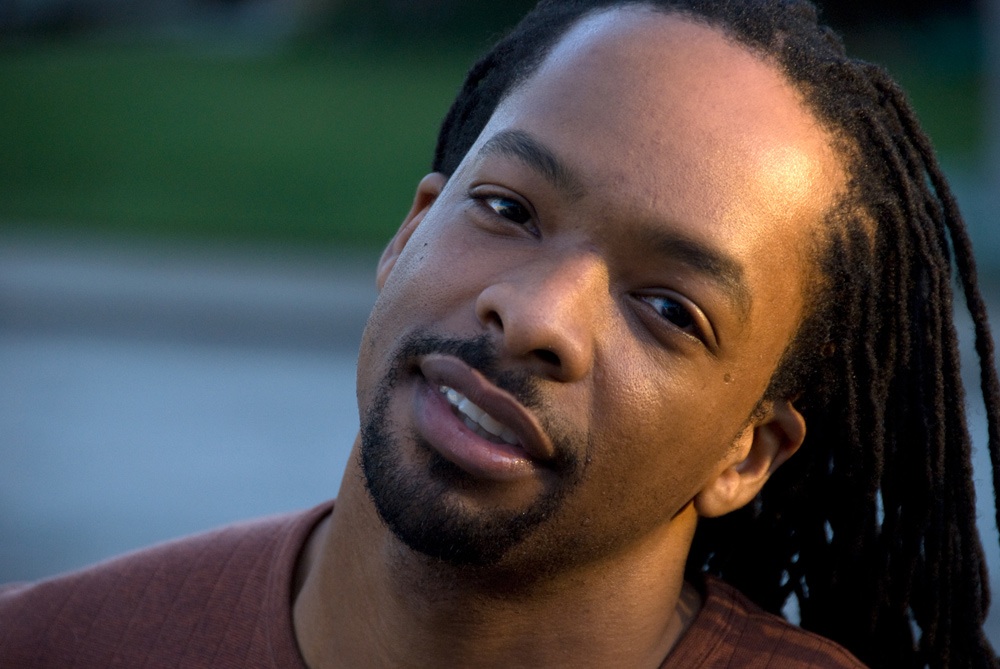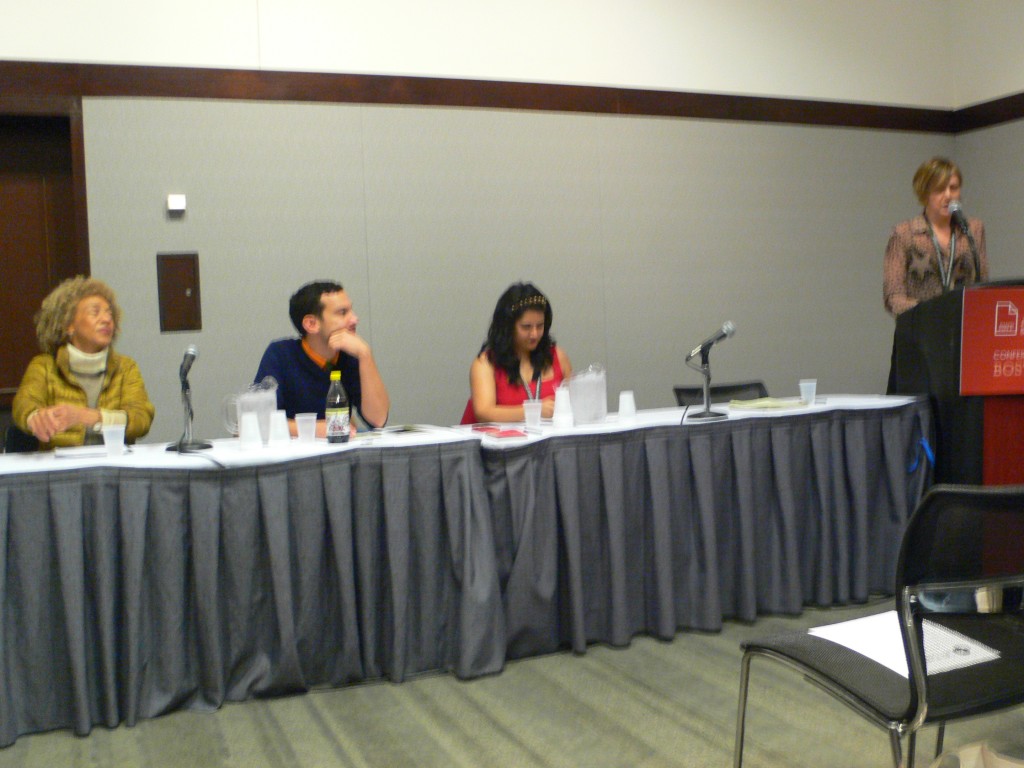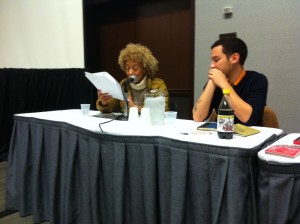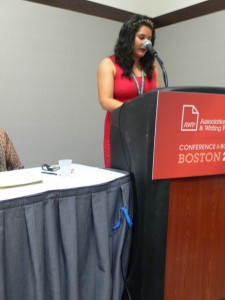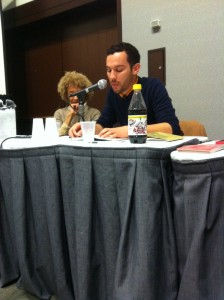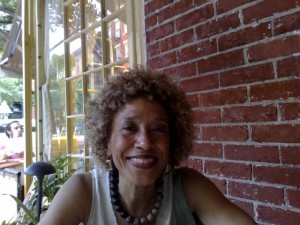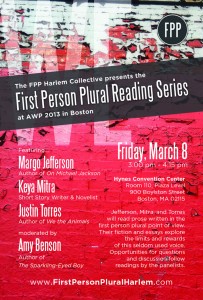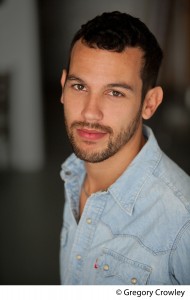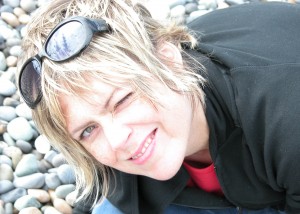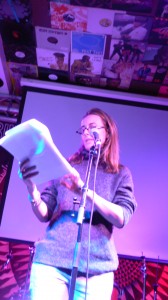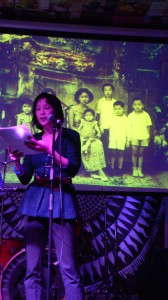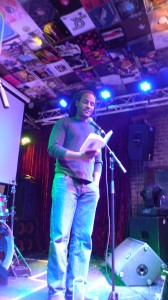Our last event of the season will be a big one! Poet Jericho Brown, multi-disciplinary art duo eteam, poet and artist Khadijah Queen, and fiction writer Rachel Sherman will take the FPP stage at 7pm. The phenomenal DJ LadyDM will be spinning from 6:30-7:00 and again from 8:30-9:00. We can’t wait to see what they have in store!
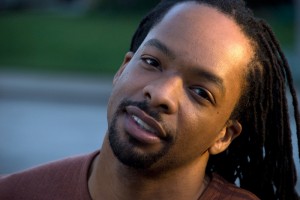 Jericho Brown worked as the speechwriter for the Mayor of New Orleans and is a recent recipient of the Whiting Writers Award and fellowships from the National Endowment for the Arts and the Radcliffe Institute at Harvard University. Brown is now an Assistant Professor at Emory University. His poems have appeared or are forthcoming in journals and anthologies including, The American Poetry Review, Boston Review, jubilat, The New Yorker, Oxford American, The New Republic, and The Best American Poetry. His first book, PLEASE, won the American Book Award.
Jericho Brown worked as the speechwriter for the Mayor of New Orleans and is a recent recipient of the Whiting Writers Award and fellowships from the National Endowment for the Arts and the Radcliffe Institute at Harvard University. Brown is now an Assistant Professor at Emory University. His poems have appeared or are forthcoming in journals and anthologies including, The American Poetry Review, Boston Review, jubilat, The New Yorker, Oxford American, The New Republic, and The Best American Poetry. His first book, PLEASE, won the American Book Award.
 Since 2001 eteam (Franziska Lamprecht and Hajoe Moderegger) traffic in transience. At the intersection of relational aesthetics, the Internet and land art, eteam coordinates collective happenings and conceptual transactions between the earthly plane and the realms of the interweb, often reconstructed in hypnotic video work, radio plays, or more recently novellas. Their projects have been featured at PS1 NY, MUMOK Vienna, Centre Pompidou Paris, Transmediale Berlin, Taiwan International Documentary Festival, New York Video Festival, and the 11thBiennale of Moving Images in Geneva. They have received grants from Art in General, NYSCA, Rhizome, Creative Capital and the John Simon Guggenheim Memorial Foundation and were residents at the CLUI, Eyebeam, Smack Mellon, Yaddo and the Mac Dowell Colony.
Since 2001 eteam (Franziska Lamprecht and Hajoe Moderegger) traffic in transience. At the intersection of relational aesthetics, the Internet and land art, eteam coordinates collective happenings and conceptual transactions between the earthly plane and the realms of the interweb, often reconstructed in hypnotic video work, radio plays, or more recently novellas. Their projects have been featured at PS1 NY, MUMOK Vienna, Centre Pompidou Paris, Transmediale Berlin, Taiwan International Documentary Festival, New York Video Festival, and the 11thBiennale of Moving Images in Geneva. They have received grants from Art in General, NYSCA, Rhizome, Creative Capital and the John Simon Guggenheim Memorial Foundation and were residents at the CLUI, Eyebeam, Smack Mellon, Yaddo and the Mac Dowell Colony.
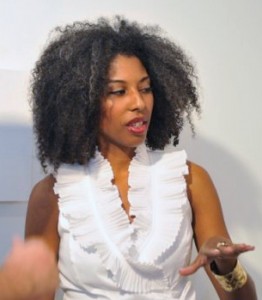 Born near Detroit and raised in Los Angeles, Khadijah Queen is the author of Conduit (Black Goat / Akashic Books 2008) and Black Peculiar, winner of the 2010 Noemi Press award for poetry. Individual poems appear widely in journals and anthologies including Best American Nonrequired Reading (Houghton Mifflin 2010), Villanelles (Random House 2012), jubilat and Eleven Eleven. The recipient of fellowships from Cave Canem and the Norman Mailer Writers’ Colony, her poetry has been nominated for the Pushcart Prize four times. She holds an MFA in creative writing from Antioch University Los Angeles and curates the multicultural/multi-genre reading series Courting Risk.
Born near Detroit and raised in Los Angeles, Khadijah Queen is the author of Conduit (Black Goat / Akashic Books 2008) and Black Peculiar, winner of the 2010 Noemi Press award for poetry. Individual poems appear widely in journals and anthologies including Best American Nonrequired Reading (Houghton Mifflin 2010), Villanelles (Random House 2012), jubilat and Eleven Eleven. The recipient of fellowships from Cave Canem and the Norman Mailer Writers’ Colony, her poetry has been nominated for the Pushcart Prize four times. She holds an MFA in creative writing from Antioch University Los Angeles and curates the multicultural/multi-genre reading series Courting Risk.
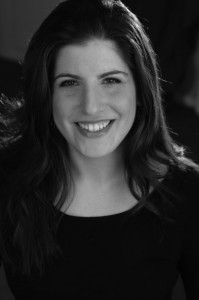 Rachel Sherman holds an MFA in fiction from Columbia University. Her short stories have appeared in McSweeney’s, Fence, Open City, Conjunctions, and n+1, among other publications. Her first book, The First Hurt, was short-listed for the Story Prize and the Frank O’Connor International Short Story Award, and was named one of the 25 Books to Remember in 2006 by the New York Public Library. Her first novel, Living Room, was released in 2009, also to broad critical acclaim. She teaches writing at Rutgers and Columbia Universities, and in Ditmas Park. She blogs for the Parenting Section of The Huffington Post.
Rachel Sherman holds an MFA in fiction from Columbia University. Her short stories have appeared in McSweeney’s, Fence, Open City, Conjunctions, and n+1, among other publications. Her first book, The First Hurt, was short-listed for the Story Prize and the Frank O’Connor International Short Story Award, and was named one of the 25 Books to Remember in 2006 by the New York Public Library. Her first novel, Living Room, was released in 2009, also to broad critical acclaim. She teaches writing at Rutgers and Columbia Universities, and in Ditmas Park. She blogs for the Parenting Section of The Huffington Post.
Venue: Shrine World Music Venue
(in Black United Fun Plaza)
September 10, 2012 @ 6:45pm
2271 Adam Clayton Powell Blvd.
http://www.shrinenyc.com/
 Multi-media artists eteam talk to us about being both removed and immersed in the creation of new work, about the non-existent singular and committing to an expansive sense of “we.”
Multi-media artists eteam talk to us about being both removed and immersed in the creation of new work, about the non-existent singular and committing to an expansive sense of “we.”
